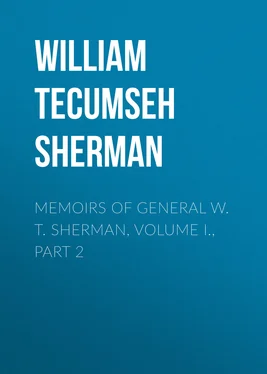William Tecumseh Sherman - Memoirs of General W. T. Sherman, Volume I., Part 2
Здесь есть возможность читать онлайн «William Tecumseh Sherman - Memoirs of General W. T. Sherman, Volume I., Part 2» — ознакомительный отрывок электронной книги совершенно бесплатно, а после прочтения отрывка купить полную версию. В некоторых случаях можно слушать аудио, скачать через торрент в формате fb2 и присутствует краткое содержание. Жанр: Биографии и Мемуары, История, foreign_edu, foreign_antique, foreign_prose, на английском языке. Описание произведения, (предисловие) а так же отзывы посетителей доступны на портале библиотеки ЛибКат.
- Название:Memoirs of General W. T. Sherman, Volume I., Part 2
- Автор:
- Жанр:
- Год:неизвестен
- ISBN:нет данных
- Рейтинг книги:3 / 5. Голосов: 1
-
Избранное:Добавить в избранное
- Отзывы:
-
Ваша оценка:
- 60
- 1
- 2
- 3
- 4
- 5
Memoirs of General W. T. Sherman, Volume I., Part 2: краткое содержание, описание и аннотация
Предлагаем к чтению аннотацию, описание, краткое содержание или предисловие (зависит от того, что написал сам автор книги «Memoirs of General W. T. Sherman, Volume I., Part 2»). Если вы не нашли необходимую информацию о книге — напишите в комментариях, мы постараемся отыскать её.
Memoirs of General W. T. Sherman, Volume I., Part 2 — читать онлайн ознакомительный отрывок
Ниже представлен текст книги, разбитый по страницам. Система сохранения места последней прочитанной страницы, позволяет с удобством читать онлайн бесплатно книгу «Memoirs of General W. T. Sherman, Volume I., Part 2», без необходимости каждый раз заново искать на чём Вы остановились. Поставьте закладку, и сможете в любой момент перейти на страницу, на которой закончили чтение.
Интервал:
Закладка:
Your movement of the troops was not countermanded by me because I thought it an unwise one in itself, but because I was not then ready for it. I had better information of Price's movements than you had, and I had no apprehension of an attack. I intended to concentrate the forces on that line, but I wished the movement delayed until I could determine on a better position.
After receiving Lieutenant-Colonel McPherson's report, I made precisely the location you had ordered. I was desirous at the time not to prevent the advance of Price by any movement on our part, hoping that he would move on Lexington; but finding that he had determined to remain at Osceola for some time at least, I made the movement you proposed. As you could not know my plans, you and others may have misconstrued the reason of my countermanding your orders....
I hope to see you well enough for duty soon. Our organization goes on slowly, but we will effect it in time. Yours truly,
H. W. HALLECK.
And subsequently, in a letter to Hon. Thomas Ewing, in answer to some inquiries involving the same general subject, General Halleck wrote as follows:
Hon. THOMAS EWING, Lancaster, Ohio.
DEAR SIR: Your note of the 13th, and one of this date, from Mr. Sherman, in relation to Brigadier-General Sherman's having being relieved from command in Sedalia, in November last, are just received. General Sherman was not put in command at Sedalia; he was authorized to assume it, and did so for a day or two. He did not know my plans, and his movement of troops did not accord with them. I therefore directed him to leave them as they were, and report here the result of his inspection, for which purpose be had been ordered there.
No telegram or dispatch of any kind was sent by me, or by any one with my knowledge or authority, in relation to it. After his return here, I gave him a leave of absence of twenty days, for the benefit of his health. As I was then pressing General McClellan for more officers, I deemed it necessary to explain why I did so. I used these words: "I am satisfied that General Sherman's physical and mental system is so completely broken by labor and care as to render him, for the present, unfit for duty; perhaps a few weeks' rest may restore him." This was the only communication I made on the subject. On no occasion have I ever expressed an opinion that his mind was affected otherwise than by over-exertion; to have said so would have done him the greatest injustice.
After General Sherman returned from his short leave, I found that his health was nearly restored, and I placed him temporarily in command of the camp of instruction, numbering over fifteen thousand men. I then wrote to General McClellan that he would soon be able to again take the field. I gave General Sherman a copy of my letter. This is the total of my correspondence on the subject. As evidence that I have every confidence in General Sherman, I have placed him in command of Western Kentucky—a command only second in importance in this department. As soon as divisions and columns can be organized, I propose to send him into the field where he can render most efficient service. I have seen newspaper squibs, charging him with being "crazy," etc. This is the grossest injustice; I do not, however, consider such attacks worthy of notice. The best answer is General Sherman's present position, and the valuable services he is rendering to the country. I have the fullest confidence in him.
Very respectfully, your obedient servant,
H. W. HALLECK, Major-General.
On returning to St. Louis, on the expiration of my leave of absence, I found that General Halleck was beginning to move his troops: one part, under General U. S. Grant, up the Tennessee River; and another part, under General S. R. Curtis, in the direction of Springfield, Missouri. General Grant was then at Paducah, and General Curtis was under orders for Rolls. I was ordered to take Curtis's place in command of the camp of instruction, at Benton Barracks, on the ground back of North St. Louis, now used as the Fair Grounds, by the following order: >
[Special Order No. 87].
HEADQUARTERS DEPARTMENT OF THE MISSOURI
St. Louis, December 23, 1861
[EXTRACT.]
Brigadier-General W. T. Sherman, United States Volunteers, is hereby assigned to the command of the camp of instruction and post of Benton Barracks. He will have every armed regiment and company in his command ready for service at a moment's warning, and will notify all concerned that, when marching orders are received, it is expected that they will be instantly obeyed; no excuses for delay will be admitted. General Sherman will immediately report to these headquarters what regiments and companies, at Benton Barracks, are ready for the field.
By order of Major-General Halleck,
J. C. KELTEN, Assistant Adjutant-General.
I immediately assumed command, and found, in the building constructed for the commanding officer, Brigadier-General Strong, and the family of a captain of Iowa cavalry, with whom we boarded. Major Curtis, son of General Curtis, was the adjutant-general, but was soon relieved by Captain J. H. Hammond, who was appointed assistant adjutant-general, and assigned to duty with me.
Brigadier-General Hurlbut was also there, and about a dozen regiments of infantry and cavalry. I at once gave all matters pertaining to the post my personal attention, got the regiments in as good order as possible, kept up communication with General Halleck's headquarters by telegraph, and, when orders came for the movement of any regiment or detachment, it moved instantly. The winter was very wet, and the ground badly drained. The quarters had been erected by General Fremont, under contract; they were mere shells, but well arranged for a camp, embracing the Fair Grounds, and some forty acres of flat ground west of it. I instituted drills, and was specially ordered by General Halleck to watch Generals Hurlbut and Strong, and report as to their fitness for their commissions as brigadier-generals. I had known Hurlbut as a young lawyer, in Charleston, South Carolina, before the Mexican War, at which time he took a special interest in military matters, and I found him far above the average in the knowledge of regimental and brigade drill, and so reported. General Strong had been a merchant, and he told me that he never professed to be a soldier, but had been urged on the Secretary of War for the commission of a brigadier-general, with the expectation of be coming quartermaster or commissary-general. He was a good, kind-hearted gentleman, boiling over with patriotism and zeal. I advised him what to read and study, was considerably amused at his receiving instruction from a young lieutenant who knew the company and battalion drill, and could hear him practise in his room the words of command, and tone of voice, "Break from the right, to march to the left!" "Battalion, halt!" "Forward into line!" etc. Of course I made a favorable report in his case. Among the infantry and cavalry colonels were some who afterward rose to distinction—David Stuart, Gordon Granger, Bussey, etc., etc.
Though it was mid-winter, General Halleck was pushing his preparations most vigorously, and surely he brought order out of chaos in St. Louis with commendable energy. I remember, one night, sitting in his room, on the second floor of the Planters' House, with him and General Cullum, his chief of staff, talking of things generally, and the subject then was of the much-talked-of "advance," as soon as the season would permit. Most people urged the movement down the Mississippi River; but Generals Polk and Pillow had a large rebel force, with heavy guns in a very strong position, at Columbus, Kentucky, about eighteen miles below Cairo. Commodore Foote had his gunboat fleet at Cairo; and General U. S. Grant, who commanded the district, was collecting a large force at Paducah, Cairo, and Bird's Point. General Halleck had a map on his table, with a large pencil in his hand, and asked, "where is the rebel line?" Cullum drew the pencil through Bowling Green, Forts Donelson and Henry, and Columbus, Kentucky. "That is their line," said Halleck. "Now, where is the proper place to break it?" And either Cullum or I said, "Naturally the centre." Halleck drew a line perpendicular to the other, near its middle, and it coincided nearly with the general course of the Tennessee River; and he said, "That's the true line of operations." This occurred more than a month before General Grant began the movement, and, as he was subject to General Halleck's orders, I have always given Halleck the full credit for that movement, which was skillful, successful, and extremely rich in military results; indeed, it was the first real success on our side in the civil war. The movement up the Tennessee began about the 1st of February, and Fort Henry was captured by the joint action of the navy under Commodore Foote, and the land forces under General Grant, on the 6th of February, 1862. About the same time, General S. R. Curtis had moved forward from Rolls, and, on the 8th of March, defeated the rebels under McCulloch, Van Dom, and Price, at Pea Ridge.
Читать дальшеИнтервал:
Закладка:
Похожие книги на «Memoirs of General W. T. Sherman, Volume I., Part 2»
Представляем Вашему вниманию похожие книги на «Memoirs of General W. T. Sherman, Volume I., Part 2» списком для выбора. Мы отобрали схожую по названию и смыслу литературу в надежде предоставить читателям больше вариантов отыскать новые, интересные, ещё непрочитанные произведения.
Обсуждение, отзывы о книге «Memoirs of General W. T. Sherman, Volume I., Part 2» и просто собственные мнения читателей. Оставьте ваши комментарии, напишите, что Вы думаете о произведении, его смысле или главных героях. Укажите что конкретно понравилось, а что нет, и почему Вы так считаете.












